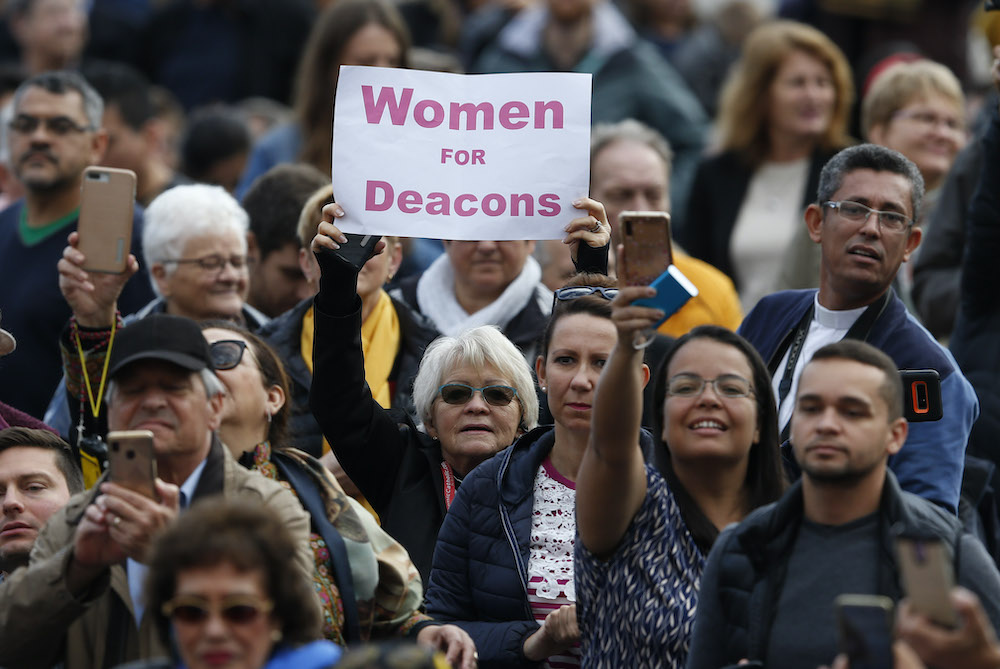
A woman holds a sign in support of women deacons as Pope Francis leads his general audience in St. Peter's Square at the Vatican Nov. 6, 2019. (CNS/Paul Haring)
By all accounts, Pope Francis has had an eventful papacy.
This first pope from the Americas has breathed new life into the reforms of the Second Vatican Council, refashioned the Vatican's staid bureaucracy, and pushed the Catholic Church to focus on the needs of the environment and global peripheries.
One especially interesting turn: Only 22 years after Pope John Paul II claimed the church had "no authority whatsoever" to ordain women as priests, Francis in 2016 created a first-of-its-kind papal commission to study the history of the ordination of women as Catholic deacons. Even more, in 2020, after that commission had wrapped up its work, the pope created another.
For an institution known for thinking in terms of millennia, this is something akin to lightspeed. And Francis deserves special applause for listening to the voices of Catholic sisters, long neglected, or, worse, mistreated by the Vatican, who bravely asked him to create the first commission.
What's particularly frustrating, then, is the near-complete lack of transparency about the work of the commissions.
Advertisement
Asked by NCR's then-Vatican correspondent Joshua J. McElwee in 2019 about the first group's research, Francis said the 12 members of that commission had been unable to find consensus about the role of women deacons in the early church. A few days later, the pope announced the group had written a report. He formally handed the text over to the Rome-based umbrella organization of Catholic sisters around the world, the International Union of Superiors General, or UISG.
The document has never been released publicly. The UISG and the commission members have kept almost total silence about what it said. But as Phyllis Zagano, a recognized global expert who served on the commission, has summarized, the pope said he gave only a portion of their text to the sisters. The rest remains, presumably, with the Vatican's powerful Dicastery for the Doctrine of the Faith.
The work of the second commission is even murkier. Although one Catholic news outlet reported that it had met together for the first time in August 2021, more than a year after the announcement, the Vatican has released no other information about its operations. It is officially unknown how many times the group has met, if they are still meeting, or if they have written a report of their own. The lack of information is egregious.
In just a few weeks, Francis is set to launch on Oct. 4 what will likely be one of the landmark initiatives of his papacy. Some 450 bishops, priests, sisters and laypeople are headed to Rome for the first of two assemblies of the Synod of Bishops. For the first time ever, laypeople, including women, have been appointed as full voting members of the synod. And the role of women in the church, including the possibility of women serving in ordained ministry, is officially on the agenda.
The courageous young adults who took part in the 2018 Synod of Bishops on young people pushed the 267 voting bishops at that assembly to say together that it was a "duty of justice" for the church to better include women in its all-male decision-making structures.
Now that this upcoming synod has again clearly identified women's ministry as a crucial topic, Francis has a duty to provide the synod members all pertinent research. Before the synod opens, he should give the synod assembly an official accounting of the work of the women deacons commissions. And he should release the full version of the 2019 report.





